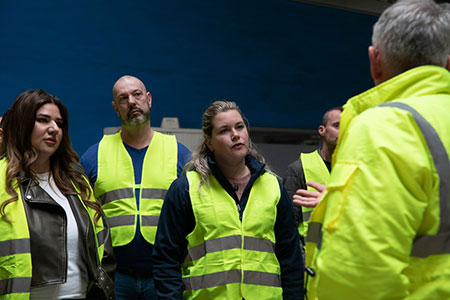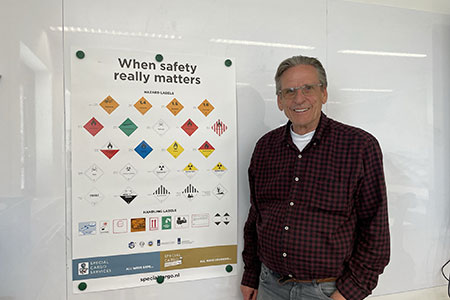1 July is the big day: all training in the Netherlands for the transportation of dangerous goods by air will be conducted in compliance with a new methodology: the CBTA from IATA. As the first IATA accredited trainer in the Netherlands Special Cargo is working hard to integrate this training into its available courses. On behalf of Special Cargo, co-founder Hans van der Maat has been involved in the development of the methodology. “The CBTA training courses are more efficient, and that benefits both employees and employers.”
“The entire aviation world is transitioning from a traditional training approach to a new method of training employees”, says Hans van der Maat, who founded SCS Training and Consultancy (brand name: Special Cargo College) in 2003. Not only for the transportation of dangerous goods: pilots, cabin crew and logistics employees will also be, or already are, trained in a new way. That new way is called Competency Based Training & Assessment (CBTA).
What is CBTA?
So, what exactly is competency-based training and assessment? Basically, the training courses focus on competences associated with specific jobs. Hans explains: “This means you’re trained for the tasks and responsibilities that match your job position. And thus trained less on subjects you’ll never be using in practice.” To explain the CBTA approach to its clients, Special Cargo is organising a number of knowledge sessions in June (refer to the box below this article).
ICAO and IATA
The driving force behind this large-scale change is the United Nations’ International Civil Aviation Organisation. One of its working groups is the ICAO Dangerous Goods Panel, which is responsible for the Technical Instructions: the international regulations for the transportation of dangerous goods by air. Aviation organisation IATA is complying with this in its IATA Dangerous Goods Regulations (IATA DGR). These are the practical guidelines used by the aviation industry. IATA is also involved in the training and certification of personnel involved in the transportation of dangerous goods by air.
Knowledge partner
In 2019, the ICAO Dangerous Goods Panel – after years of consultation – reached agreement on the introduction of CBTA with effect from January 2023. The IATA DGR were also revised to reflect the changes. Hans was involved in these changes from the beginning, as a consultant to the Dutch panel member on the ICAO Dangerous Goods Panel. He attended ICAO meetings in this capacity. “So SCS Training & Consultancy has been a knowledge partner of the government for many years. And we continue to be,” says Hans, who has now retired but remains active in the background.
Role of employer
The train of thoughts at IATA CBTA implies the responsibility of the employer for training staff in compliance with the regulations. This can be achieved through an accredited training institute. The employer is required to provide interim assessments to verify whether the staff can perform their jobs. Hans continues: “As an employer, you need to ensure that the knowledge and skills of your staff are and remain up to date. And the Dutch government’s Inspectorate for the Environment and Transport (ILT) is responsible for ensuring – by conducting inspections – that this actually takes place.”

Guidance
The CBTA approach is included as regulations in the 2023-2024 edition of the ICAO Technical Instructions and in the 64th edition of the IATA DGR, which is updated annually and came into force on 1 January 2023. Hans: “The CBTA regulations are not an integral part of the DGR, so a separate booklet has been created for them: Dangerous Goods Training Guidance. Which is only good for the users – unlike IATA DGR it’s free to download.”
Introduction in the Netherlands
Based on this major change in the law, the Dutch regulations also had to be amended, including the Regulations on the Accreditation of Training Institutions and Assessments for the Transportation of Dangerous Goods by Air. Hans continues, “And these regulations contain a transition period of six months. This means that CBTA training will officially enter into force in the Netherlands on 1 July.”
Assessments
Every CBTA training course always includes an assessment in the form of an exam or practical test. In the Netherlands, this is not conducted by an independent party, such as the CBR, but is provided by the trainer, as are the courses themselves. The trainer must as a matter of course meet the requirements in the above-mentioned regulations. The training courses and assessments must therefore be approved by the ILT. “Because otherwise it would, of course, become very easy to get all your trainees to pass.”
IATA accreditation
“But as far as that’s concerned, you’re in the right place with Special Cargo”, he continues. “As the first training provider in the Netherlands, we were CBTA accredited by IATA last year. This means that our training courses and assessments are guaranteed to meet IATA’s requirements. To achieve this, we were audited for two days by IATA: the entire organisation and our work processes were scrutinized. The result was positive. We can proudly say that we meet the most stringent standards.” In addition, trainees who pass an IATA CBTA course at Special Cargo can receive an IATA certificate. It is valued worldwide and is registered with IATA in Montreal. Non-IATA-accredited trainers are unable to issue IATA certificates.
No unnecessary ballast
Hans is developing all IATA CBTA courses for Special Cargo. Some can already be attended at present, but as from June 1st companies will be able to enrol for all courses. Hans is happy that the new methodology is finally becoming official: “It’s much better to train employees for the functions and tasks they perform. That avoids unnecessary ‘ballast’.” He gives an example. “Previously, if you wanted to become IATA certified for dangerous goods, you also received an entire day of training on classifying dangerous goods. Even though you probably had no practical use for it. That’s no longer necessary with the IATA CBTA methodology.”

Accreditation
For the purpose of the IATA CBTA system, the Dutch government works with an accreditation system, with one accreditation per role in the logistics process (A to E):
A: for consignors
B: for forwarders/air cargo agents
C: for ground handlers
D: for logistics service providers
E: for organisations specialising in the transportation of dangerous goods by air
The accreditation determines the type of training you need to undergo in the new IATA training methodology. This means that the familiar IATA DGR categories 1 to 12 are converted to job-based courses IATA 7.1 to 7.10. For example, if you are a consigner of different hazard classes but do not need to classify, you used to do the basic Dangerous Goods Air Transportation course (categories 1, 3 and 6). In the new format, you take IATA course 7.1B: Preparing Dangerous Goods for Transportation by Air.
Less time
Hans continues: “And the great thing is the total training time results a lot shorter. Which is quite logical as you only have to learn what you need for your job. That’s why, instead of four days, many courses now only take three classroom days. And in the case mentioned above (7.1B) the training only takes two days. And it gets even better: Special Cargo has turned the general section (basic knowledge of the transportation of dangerous goods by air (7.0)), into an e-learning course. You take this prior to the classroom training, at a time that suits you.”
Safety
Overall, Hans sees only advantages with the new training method: “It’s way more efficient, benefiting not only the employee but also the employer: he ‘loses’ his employees for a shorter time. But more importantly: it also benefits safety. After all, employees are better equipped to perform their jobs. That’s what we all do it for in the end.”
Knowledge sessions
The transition from the existing policy to the IATA CBTA structure may raise questions. To address this, Special Cargo College is organising knowledge sessions on the introduction of the IATA CBTA methodology during the month of June. Would you like to attend? Subscribe to our newsletter now. You will then receive an invitation. You can subscribe here >>







